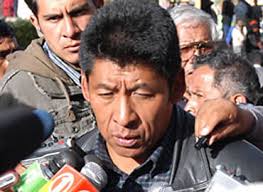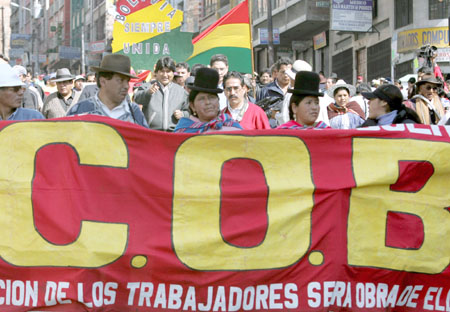Bolivia: is the romance over?
By Jim Shultz of he Democracy Center*
Since the first arrival of Evo Morales to the Bolivian presidency in 2005 with a lopsided and historic majority, one of the ongoing questions has been – Who will genuinely challenge him?
In the early stages that challenge came from the anemic remaining national opposition let by PODEMOS and his 2005 opponent, former President Jorge Quiroga, but with little impact on the Morales/MAS juggernaut. Then opposition to Morales jelled together in a serious way in the hands of six opposition governors and Morales adversaries in the nation’s east, enough to almost scuttle the Constituent Assembly. But when Morales called the governors’ bluff and held an August 2008 referendum, two of the main opposition governors were tossed out of office and Morales was returned with a mandate even stronger than before.
Now, following another huge Morales ballot triumph in his reelection last December and MAS control over a majority of the governorships, it seemed like he would begin his second term almost unchallenged.
 Tens of thousands of marchers in downtown Cochabamba this morning [04 May] turned that into a political myth. These were not Manfredistas or other remnants of the political right. These marchers came from the core of what has been, up till now, a key element in Morales’ political base – the powerful Centro Obrero Boliviana (COB), the labor organization that has toppled more than one Bolivian president. The issue is the demand by the workers, both public and private sector, for a substantial pay hike, and efforts by Morales to stick to a smaller one.
Tens of thousands of marchers in downtown Cochabamba this morning [04 May] turned that into a political myth. These were not Manfredistas or other remnants of the political right. These marchers came from the core of what has been, up till now, a key element in Morales’ political base – the powerful Centro Obrero Boliviana (COB), the labor organization that has toppled more than one Bolivian president. The issue is the demand by the workers, both public and private sector, for a substantial pay hike, and efforts by Morales to stick to a smaller one.
But there is far more at stake here than the difference between one percentage raise vs. another. On display this week, in Cochabamba, in La Paz and elsewhere in the country, is the face of a new challenge, a powerful one, to Morales.
Here’s a special report from Jessica Camille Aguirre and Aldo Orellana of the Democracy Center.
Morales and Bolivia’s Unions: Is the Romance Over?
There have been many mentions of love in the Bolivian newspapers these days, but the headlines read more like a bad breakup. For the first time since Gonzalo Sanchez de Lozada (‘Goni’) and then Carlos Mesa were ran out of presidential office, the Central Obrera Boliviana (COB) is out on the streets threatening an indefinite general strike.
COB, a national union that represents most workers, has been closely aligned with MAS after years of tenuous relationship with various Bolivian governments. The protests, which began in earnest in La Paz on Monday, represent the first serious break with the Morales administration.
The demonstrations are in response to the government’s announcement of this year’s minimum wage increase, which will be 5 percent. The COB had announced their demands for an increase of at least 12 percent, and in response to the disappointment they are taking to the streets, announcing strikes and recalling a time of widespread unrest in Bolivia.
As conservative forces within national politics have disintegrated over the past months – particularly with the recent departmental elections this past April – the question has been who would be next to challenge Bolivia’s popular President. COB may have just provided an answer. It looks like dissent will once again come from the same place it always has.
The Streets Rumble Again
COB has been one of the main arteries of Bolivian social movements and politics since the revolution of 1952, and they have occupied the nightmares of many a conservative politician since then.
The union is nationwide (though it also exists on a departmental level), and it represents nearly every type of worker imaginable. Factory workers, teachers, health workers and miners make up the strongest base of the organization.
The history of Bolivia could be told through the history of COB. Under the dictatorships, it experienced repression and massacres. With the weakening of the mining sectors in the mid-1980s and the bankruptcy of national mining company COMIBOL, the COB lost much of its political power. But over the past decade the organization has undergone resurgence, playing a pivotal role in the decisive social upheavals of recent history. COB is one of the reasons that the specter of Bolivian miners in parade strikes fear into the hearts of bureaucrats and gives hope to enervated mobilizations.
Morales’ 2005 election cast a brief temporizing effect over the union as social movements rallied behind what was to be their strongest ally.  Pedro Montes, one of the most important leaders of the COB has worked closely with the government over the last few years, and minimum wage salary requests have been an ongoing compromise.
Pedro Montes, one of the most important leaders of the COB has worked closely with the government over the last few years, and minimum wage salary requests have been an ongoing compromise.
Each year Bolivia’s national government announces by how much the federal minimum wage will rise. Since Morales took office the increase has been between 6 and 12.5 percent every year. This year, the increase announcement came on May 1st – international workers day.
This year that increase was limited to a more frugal 5% (bringing the total to 647 Bolivianos, or US$92 per month). “Considering that the 5 percent is only 32 Bolivianos (US$4.55), that’s nothing and it doesn’t cover all the prices that are going up in the family basket” René Crespo, a Cochabambino factory worker representative told Los Tiempos. The family basket he is referring to is the estimation of the price value of all good and services that the average family needs. While the minimum salary is supposedly based on this amount, Bolivian non-profit CEDLA estimated the basket to be at least 3,578 Bolivianos (US$510) in 2009.
This disappointment has fragmented and enraged the COB. Its factory workers are now demanding at least 12 percent while the teachers say they won’t settle for less than 25 percent. Members are also venting their anger at their MAS-linked leader, Pedro Montes. The problem, they say, is that he aligned himself too closely with the government.
“Different Priorities”
Meanwhile the recent demonstrations have turned into confrontations between police forces and protesters, particularly in La Paz. As Morales himself is in Argentina attending a UNASUR meeting, the Vice-President, Alvaro Garcia Linera, has stepped into to announce that the government has “different priorities” this year, which include resource development and education.
Though all of the workers in the COB do not receive their salaries from the government, there are many that do – and the administration says that it cannot handle the burden of the extra costs. The Ministry of Finance is also running television ads claiming that the 5% decree is larger than the current national rate of inflation. The Morales administration has also expressed concern that a significant minimum wage increase could provoke inflationary forces, creating a vicious cycle effect.
But many see the decision in more starkly political terms. The COB was the critical force in the last elections – departmental elections in April and presidential elections in last December. Indeed, the COB made up part of a national consortium of social organizations and movement that supported the consolidation of MAS political power. The consortium, called the National Council for Change (an clear reference to MAS’ own slogans), included the powerful indigenous organization CONAMAQ.With a clear mandate secured, the consortium has since disbanded.
That the right in Bolivia has been severely weakened is of little dispute. This week MAS set out to make it even weaker with another recent government decision to re-arrange the apportionment of congressional seats that would likely debilitate the right further still.
With Strength Comes Disunity
It’s an old Bolivian story, many say. Now that the main political antagonists have been decisively, if temporarily, overcome, unity on the left is not such a political necessity.
Earlier signs of some disgruntlement on Bolivia’s left were on display at last month’s global climate change meeting. There a group of Bolivian indigenous organizations and environmentalists formed the infamous Table 18, a parallel event that was organized to challenge some of Morales’ environmental policies at home just as he was challenging the policies of wealthy nations in the North.
But the thousands of workers in the streets, under a COB banner, is another species of challenge altogether, a potent one. It might all end in a simple compromise of arithmetic. But it could also be the opening act of a process of fragmentation in a broad coalition of social forces in Bolivia that have gained great power through unity, but whom are starting to get more dissatisfied with what that new power has delivered.
Once again in Bolivia, the streets are rumbling.
* First published by the Democracy Center
Any opinions or viewpoints that are published herein are directly from the contributing author and does not necessarily represent the philosophy or viewpoints of Latin America Bureau

